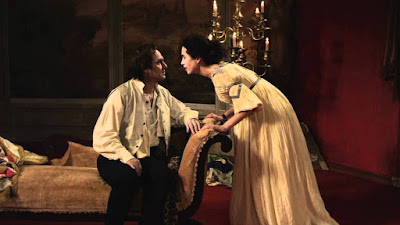Day Seven
Girl Asleep (Rosemary Myers, Australia, 2015)
Filmed in a style which simultaneously imitates both 80s
Australian television and live theatre, this debut feature finds a new way to
tell a story we’ve seen many times before. Bethany Whitmore is great as Greta,
a teenage girl growing up in a world that’s starting to confuse her. Conflict
at home and school are dealt with metaphorically in a fantasy forest, presented
in a deliberately-stagey way. It’s a kind-hearted, enjoyable film which isn’t
afraid to be a little silly. The film has been covered in more detail elsewhere
on this blog (http://filmalert101.blogspot.com.au/2016/08/afi-screenings-2016-girl-asleep.html).
Recommended.
Things to Come (Mia Hansen-Løve, France/Germany, 2016)
 |
| Isabelle Huppert in Things to Come |
Isabelle Huppert’s wonderfully subtle performance as
philosophy professor Nathalie is the driving force behind this drama. She
stands as a solid object, weathering what must be the worst year of her life as
people die, relationships end and her professional career begins to slip away
from her. We see that this hurts her, but she keeps the reaction internal,
making this a moving film, but not an overly dramatic one. There’s also much to
ponder in her friendship with an ex-student who challenges her views on life. Highly
recommended.
Albüm (Mehmet Can Mertoğlu, Turkey/France/Romania, 2016)
An exercise in misery just barely funny enough to keep an
audience on its side. A Turkish couple is unable to conceive, and goes to great
lengths to avoid letting people know they are planning to adopt. Before the
adoption, they travel to various locations, taking holiday photos with a fake
pregnancy belly, which is good for a few laughs. It’s a slow film, filled with
long takes I didn’t always understand the purpose of, but there are some very
funny/utterly horrific moments towards the end which are worth seeing. Very
mildly recommended.
Muito Romântico (Melissa Dullius & Gustavo Jahn,
Germany/Brazil, 2016)
An ‘experimental’ film, which too often seems like a label
designed for films crafted entirely from random footage. This is a vaguely
autobiographical film about a Brazilian couple who travel to Berlin by sea, shot
on 16mm film over the course of a decade. There are individual moments which
held my interest briefly, largely for visual reasons, but as a general rule I
have a fairly low tolerance for this style of film. Strongly not recommended,
but if you told me you loved it, I’d believe you.
Day Eight
A Dragon Arrives! (Mani Haghighi, Iran, 2016)
I was a little hesitant to include this film in my schedule
since it comes from Mani Haghighi, whose previous film Modest Reception (2012) proved too cynical and depressing for me
(this from a Lars von Trier fan, by the way). This is a much more enjoyable
film, telling the story of an Iranian detective in the 1960s. He appears to
have fashioned himself after the heroes in American films of the era:
sunglasses, hat and Chevrolet, and the film’s thumping soundtrack helps sell
the style. The film’s central mystery is potentially supernatural, and these
elements work well. Meta elements featuring interviews with the film’s crew are
much less successful. Mildly recommended.
Apprentice (Boo Junfeng, Singapore/Germany/France/Hong
Kong/Qatar, 2016)
Showing here after playing in Un Certain Regard at Cannes
and in competition at Sydney, Apprentice
presents a deeply troubling scenario, but stacks the deck just a little too
heavily with its plot. This is the story of young prison guard Aiman who finds
himself taken under the wing of an executioner. We learn early on that this
executioner hanged Aiman’s father, and when this becomes the focus, the plot
actively detracts from a film which was strong enough without the added twist.
The film takes its time, letting us feel the grimness of the situation as Aiman
learns the science of breaking a man’s neck while hanging him. The film stands
as a statement against the death penalty simply by making us look at the
process, and to think about it, without actually needing to say anything political.
Recommended.
Mimosas (Oliver Laxe, Spain/Morocco/France/Qatar, 2016)
Winner of the Grand Prize in the Cannes Critics’ Week
sidebar, this was my favourite randomly-selected discovery at MIFF. In this
truly unusual film, someone who appears to be a guardian angel (or culturally
appropriate equivalent) travels by taxi into the mountains of Morocco, where he
is tasked with helping two men deliver the body of a sheik for burial. It’s a
slowly-paced, spiritually-focused film positioned mostly as an arduous trek
through beautiful, inhospitable locations. The film also features an odd brand
of humour, as this is the angel’s first mission, and he’s kind of terrible at
his job. My audience didn’t seem very receptive to this one, which is their
loss. Highly recommended.
Lo and Behold: Reveries of the Connected World (Werner Herzog,
USA, 2016)
 |
| Werner Herzog |
Werner Herzog freely admits he doesn’t understand many
things about the internet and its technology, but here he has made a
broadly-focused documentary on that very subject. This takes the form of short
segments, each exploring different aspects of web technology. One sees a famous
hacker telling stories of his glory days outsmarting the FBI, one takes a look
at teens affected by addiction to videogames and one particularly horrifying
segment sees Herzog interview the family who had photos of their dead
daughter’s body emailed to them over and over by heartless internet trolls. It’s
all a bit scattershot, and Herzog for the first time risks becoming the
distracting comic relief in his own film, but there are moments here we
wouldn’t have gotten anywhere else. Herzog (jokingly?) asks his participants if
the internet could ever dream of itself. I’m not sure that question deserves
one good answer, but the film offers us
three. Mildly recommended.
 Julieta
Julieta (Pedro Almodóvar, Spain, 2016)
An unusually simple story for Almodóvar to tell, this Palme
d’Or nominee is presented largely in flashback, as the distraught titular
character tries to reconnect with her estranged daughter through an explanatory
letter. It’s a romantic and tragic tale, told with all of the director’s usual
visual flair. It’s enjoyable and involving, and the film ends very well. This
is Almodóvar at his least abrasive. It’s less ambitious than usual for him (and
certainly less sexually transgressive) and the result is a modest success, even
if it feels like a footnote in his career. Recommended.











